An Analysis of Operation and Logistics Management in the NHS Hospital
VerifiedAdded on 2020/10/22
|12
|3127
|132
Report
AI Summary
This report provides an analysis of operation and logistics management within the National Health Service (NHS). It begins with an introduction to the NHS and the chosen topics: managing quality and logistics mix. The main body critically reviews relevant operation, logistic, and supply chain theories, including Total Quality Management (TQM) and Just-in-Time (JIT) approaches. The report then applies these theories to the NHS hospital setting, offering solutions for managing quality through TQM and optimizing inventory through JIT and inventory management. The Triple Bottom Line approach is also considered. The report concludes with recommendations and a conclusion based on the analysis. The report highlights the importance of efficient operation and logistics in healthcare to improve patient care and reduce costs.
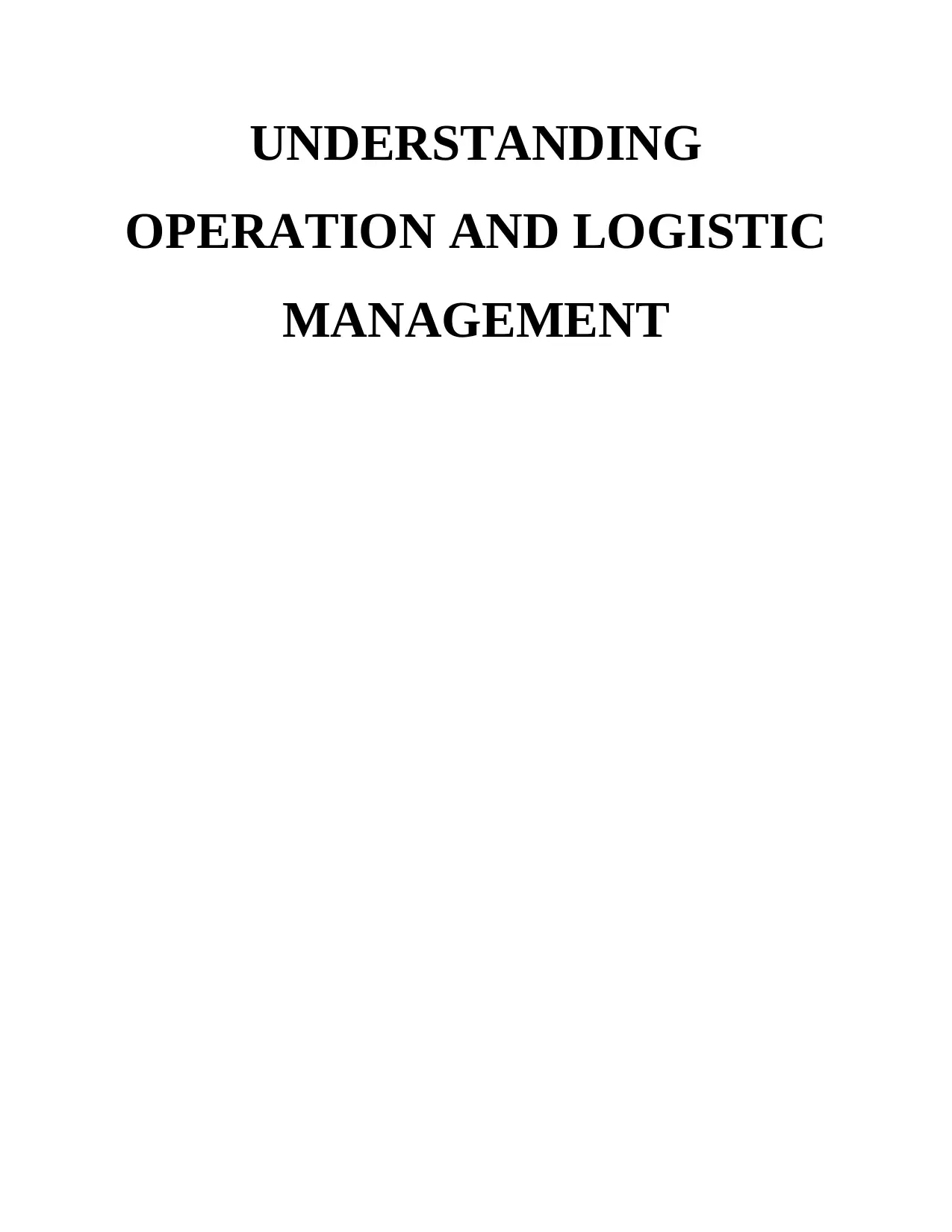
UNDERSTANDING
OPERATION AND LOGISTIC
MANAGEMENT
OPERATION AND LOGISTIC
MANAGEMENT
Paraphrase This Document
Need a fresh take? Get an instant paraphrase of this document with our AI Paraphraser
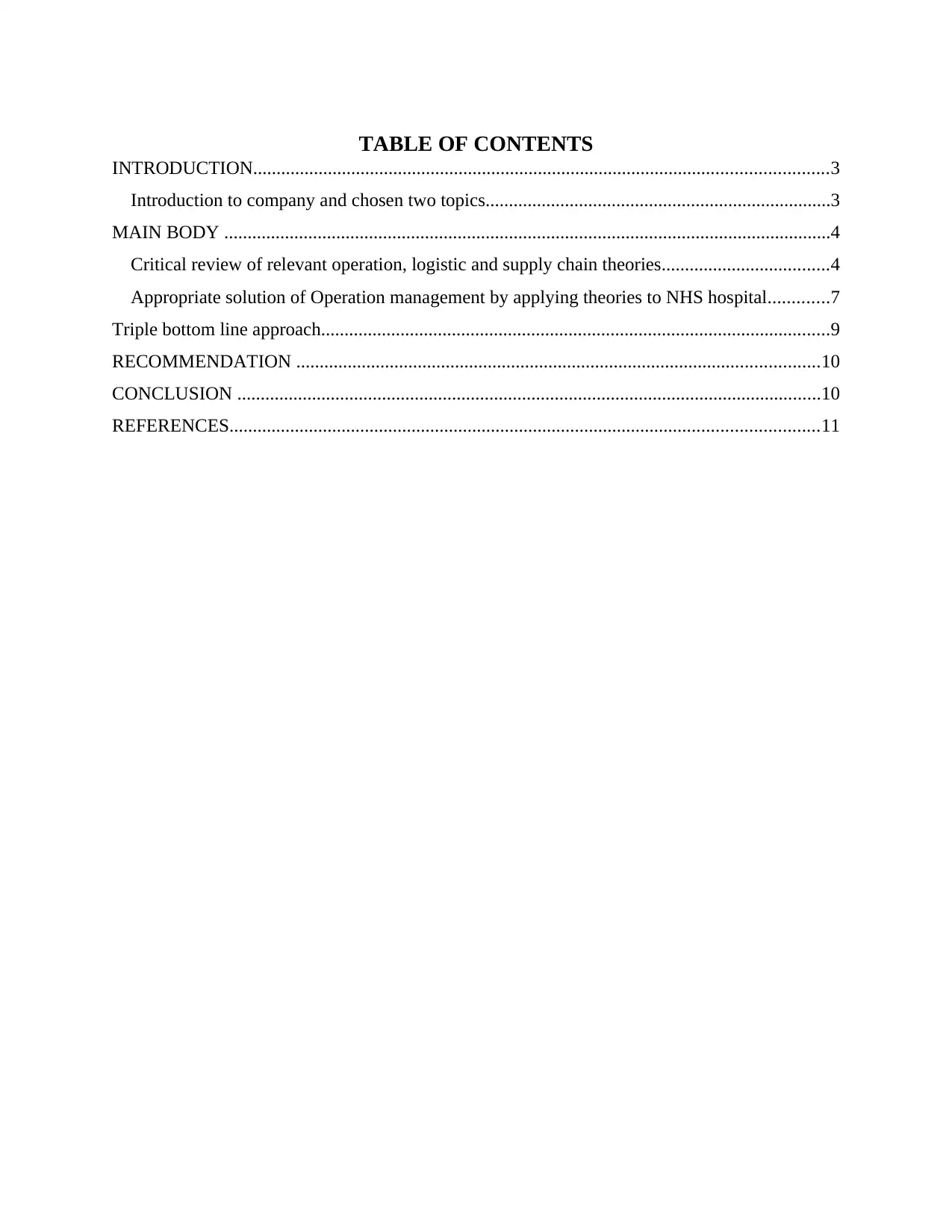
TABLE OF CONTENTS
INTRODUCTION...........................................................................................................................3
Introduction to company and chosen two topics..........................................................................3
MAIN BODY ..................................................................................................................................4
Critical review of relevant operation, logistic and supply chain theories....................................4
Appropriate solution of Operation management by applying theories to NHS hospital.............7
Triple bottom line approach.............................................................................................................9
RECOMMENDATION ................................................................................................................10
CONCLUSION .............................................................................................................................10
REFERENCES..............................................................................................................................11
INTRODUCTION...........................................................................................................................3
Introduction to company and chosen two topics..........................................................................3
MAIN BODY ..................................................................................................................................4
Critical review of relevant operation, logistic and supply chain theories....................................4
Appropriate solution of Operation management by applying theories to NHS hospital.............7
Triple bottom line approach.............................................................................................................9
RECOMMENDATION ................................................................................................................10
CONCLUSION .............................................................................................................................10
REFERENCES..............................................................................................................................11
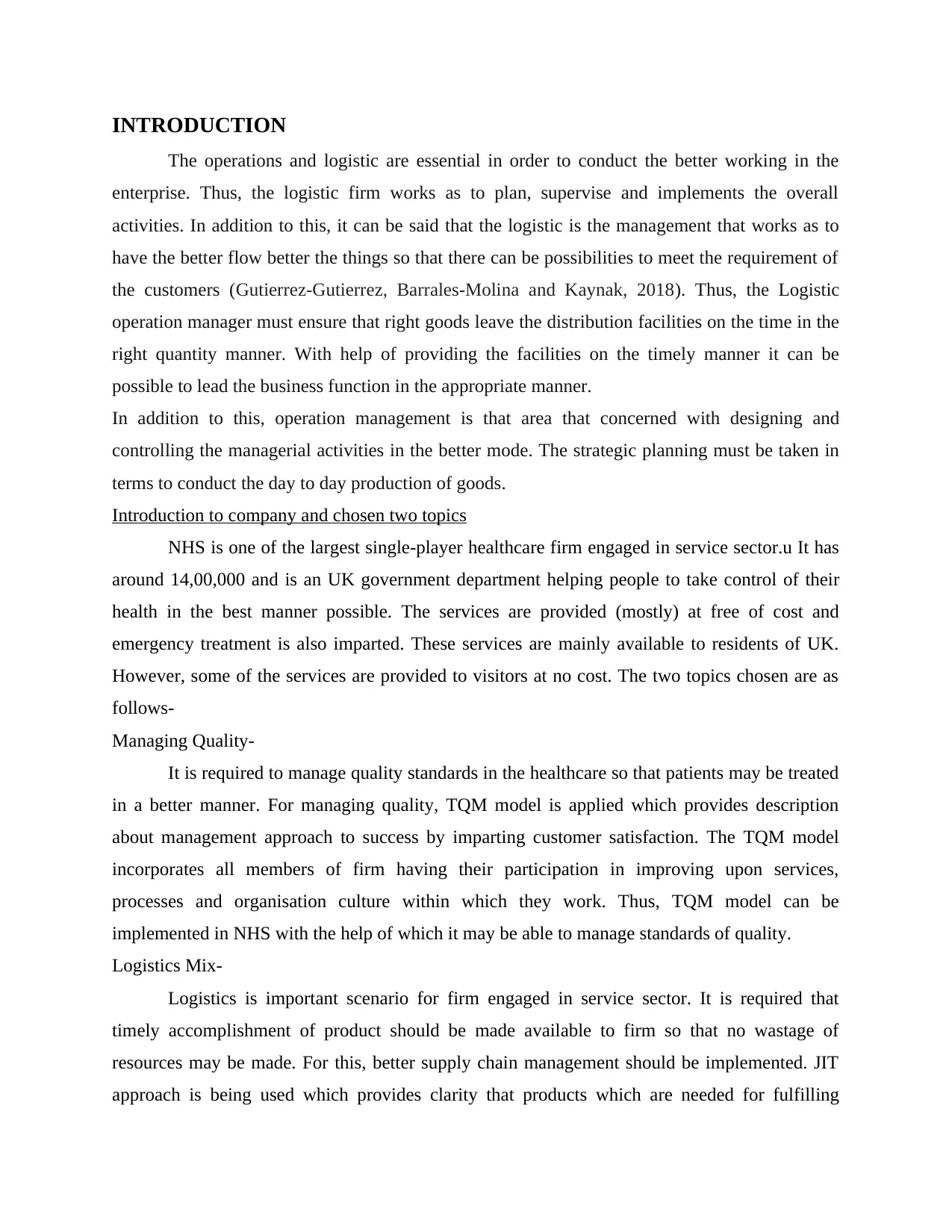
INTRODUCTION
The operations and logistic are essential in order to conduct the better working in the
enterprise. Thus, the logistic firm works as to plan, supervise and implements the overall
activities. In addition to this, it can be said that the logistic is the management that works as to
have the better flow better the things so that there can be possibilities to meet the requirement of
the customers (Gutierrez-Gutierrez, Barrales-Molina and Kaynak, 2018). Thus, the Logistic
operation manager must ensure that right goods leave the distribution facilities on the time in the
right quantity manner. With help of providing the facilities on the timely manner it can be
possible to lead the business function in the appropriate manner.
In addition to this, operation management is that area that concerned with designing and
controlling the managerial activities in the better mode. The strategic planning must be taken in
terms to conduct the day to day production of goods.
Introduction to company and chosen two topics
NHS is one of the largest single-player healthcare firm engaged in service sector.u It has
around 14,00,000 and is an UK government department helping people to take control of their
health in the best manner possible. The services are provided (mostly) at free of cost and
emergency treatment is also imparted. These services are mainly available to residents of UK.
However, some of the services are provided to visitors at no cost. The two topics chosen are as
follows-
Managing Quality-
It is required to manage quality standards in the healthcare so that patients may be treated
in a better manner. For managing quality, TQM model is applied which provides description
about management approach to success by imparting customer satisfaction. The TQM model
incorporates all members of firm having their participation in improving upon services,
processes and organisation culture within which they work. Thus, TQM model can be
implemented in NHS with the help of which it may be able to manage standards of quality.
Logistics Mix-
Logistics is important scenario for firm engaged in service sector. It is required that
timely accomplishment of product should be made available to firm so that no wastage of
resources may be made. For this, better supply chain management should be implemented. JIT
approach is being used which provides clarity that products which are needed for fulfilling
The operations and logistic are essential in order to conduct the better working in the
enterprise. Thus, the logistic firm works as to plan, supervise and implements the overall
activities. In addition to this, it can be said that the logistic is the management that works as to
have the better flow better the things so that there can be possibilities to meet the requirement of
the customers (Gutierrez-Gutierrez, Barrales-Molina and Kaynak, 2018). Thus, the Logistic
operation manager must ensure that right goods leave the distribution facilities on the time in the
right quantity manner. With help of providing the facilities on the timely manner it can be
possible to lead the business function in the appropriate manner.
In addition to this, operation management is that area that concerned with designing and
controlling the managerial activities in the better mode. The strategic planning must be taken in
terms to conduct the day to day production of goods.
Introduction to company and chosen two topics
NHS is one of the largest single-player healthcare firm engaged in service sector.u It has
around 14,00,000 and is an UK government department helping people to take control of their
health in the best manner possible. The services are provided (mostly) at free of cost and
emergency treatment is also imparted. These services are mainly available to residents of UK.
However, some of the services are provided to visitors at no cost. The two topics chosen are as
follows-
Managing Quality-
It is required to manage quality standards in the healthcare so that patients may be treated
in a better manner. For managing quality, TQM model is applied which provides description
about management approach to success by imparting customer satisfaction. The TQM model
incorporates all members of firm having their participation in improving upon services,
processes and organisation culture within which they work. Thus, TQM model can be
implemented in NHS with the help of which it may be able to manage standards of quality.
Logistics Mix-
Logistics is important scenario for firm engaged in service sector. It is required that
timely accomplishment of product should be made available to firm so that no wastage of
resources may be made. For this, better supply chain management should be implemented. JIT
approach is being used which provides clarity that products which are needed for fulfilling
⊘ This is a preview!⊘
Do you want full access?
Subscribe today to unlock all pages.

Trusted by 1+ million students worldwide
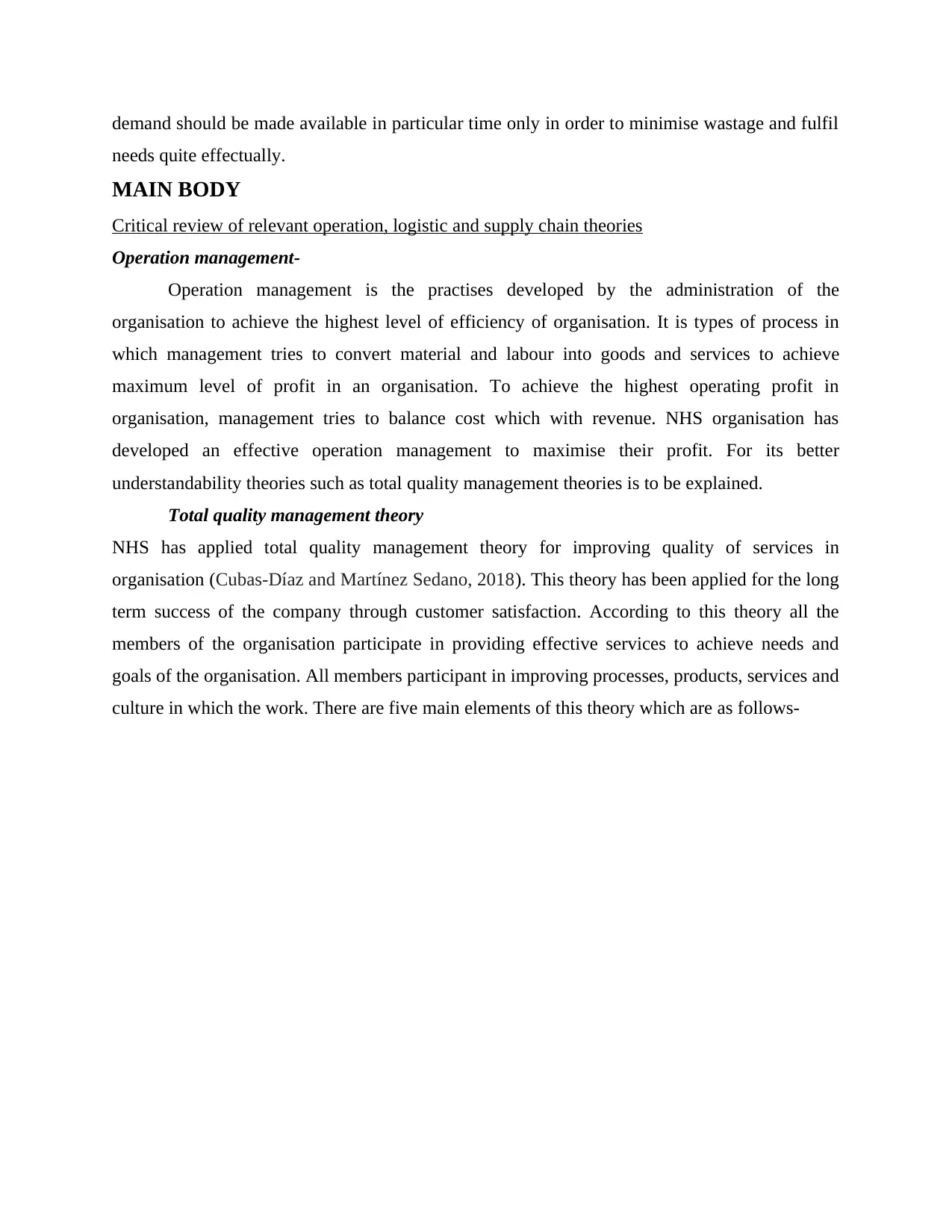
demand should be made available in particular time only in order to minimise wastage and fulfil
needs quite effectually.
MAIN BODY
Critical review of relevant operation, logistic and supply chain theories
Operation management-
Operation management is the practises developed by the administration of the
organisation to achieve the highest level of efficiency of organisation. It is types of process in
which management tries to convert material and labour into goods and services to achieve
maximum level of profit in an organisation. To achieve the highest operating profit in
organisation, management tries to balance cost which with revenue. NHS organisation has
developed an effective operation management to maximise their profit. For its better
understandability theories such as total quality management theories is to be explained.
Total quality management theory
NHS has applied total quality management theory for improving quality of services in
organisation (Cubas‐Díaz and Martínez Sedano, 2018). This theory has been applied for the long
term success of the company through customer satisfaction. According to this theory all the
members of the organisation participate in providing effective services to achieve needs and
goals of the organisation. All members participant in improving processes, products, services and
culture in which the work. There are five main elements of this theory which are as follows-
needs quite effectually.
MAIN BODY
Critical review of relevant operation, logistic and supply chain theories
Operation management-
Operation management is the practises developed by the administration of the
organisation to achieve the highest level of efficiency of organisation. It is types of process in
which management tries to convert material and labour into goods and services to achieve
maximum level of profit in an organisation. To achieve the highest operating profit in
organisation, management tries to balance cost which with revenue. NHS organisation has
developed an effective operation management to maximise their profit. For its better
understandability theories such as total quality management theories is to be explained.
Total quality management theory
NHS has applied total quality management theory for improving quality of services in
organisation (Cubas‐Díaz and Martínez Sedano, 2018). This theory has been applied for the long
term success of the company through customer satisfaction. According to this theory all the
members of the organisation participate in providing effective services to achieve needs and
goals of the organisation. All members participant in improving processes, products, services and
culture in which the work. There are five main elements of this theory which are as follows-
Paraphrase This Document
Need a fresh take? Get an instant paraphrase of this document with our AI Paraphraser
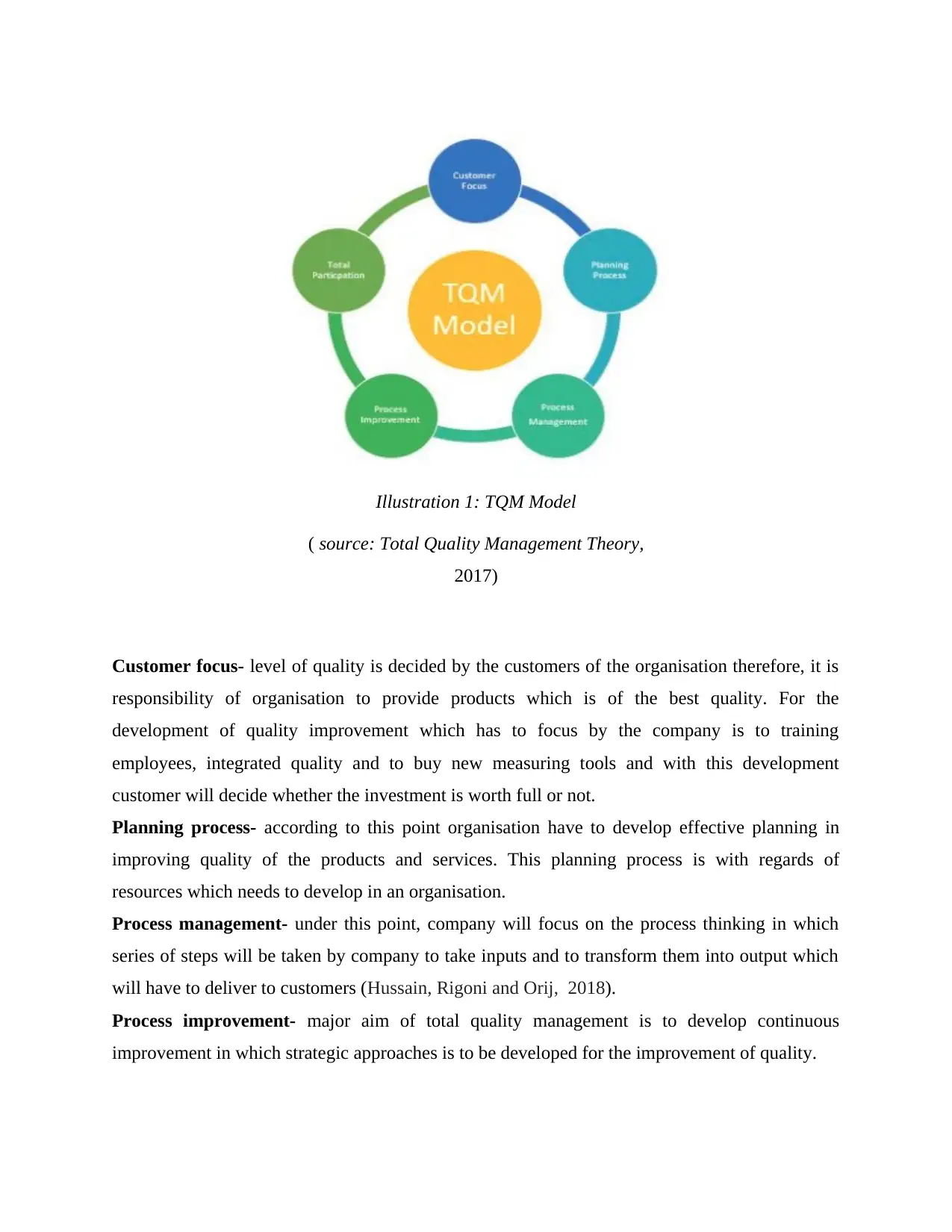
Customer focus- level of quality is decided by the customers of the organisation therefore, it is
responsibility of organisation to provide products which is of the best quality. For the
development of quality improvement which has to focus by the company is to training
employees, integrated quality and to buy new measuring tools and with this development
customer will decide whether the investment is worth full or not.
Planning process- according to this point organisation have to develop effective planning in
improving quality of the products and services. This planning process is with regards of
resources which needs to develop in an organisation.
Process management- under this point, company will focus on the process thinking in which
series of steps will be taken by company to take inputs and to transform them into output which
will have to deliver to customers (Hussain, Rigoni and Orij, 2018).
Process improvement- major aim of total quality management is to develop continuous
improvement in which strategic approaches is to be developed for the improvement of quality.
Illustration 1: TQM Model
( source: Total Quality Management Theory,
2017)
responsibility of organisation to provide products which is of the best quality. For the
development of quality improvement which has to focus by the company is to training
employees, integrated quality and to buy new measuring tools and with this development
customer will decide whether the investment is worth full or not.
Planning process- according to this point organisation have to develop effective planning in
improving quality of the products and services. This planning process is with regards of
resources which needs to develop in an organisation.
Process management- under this point, company will focus on the process thinking in which
series of steps will be taken by company to take inputs and to transform them into output which
will have to deliver to customers (Hussain, Rigoni and Orij, 2018).
Process improvement- major aim of total quality management is to develop continuous
improvement in which strategic approaches is to be developed for the improvement of quality.
Illustration 1: TQM Model
( source: Total Quality Management Theory,
2017)
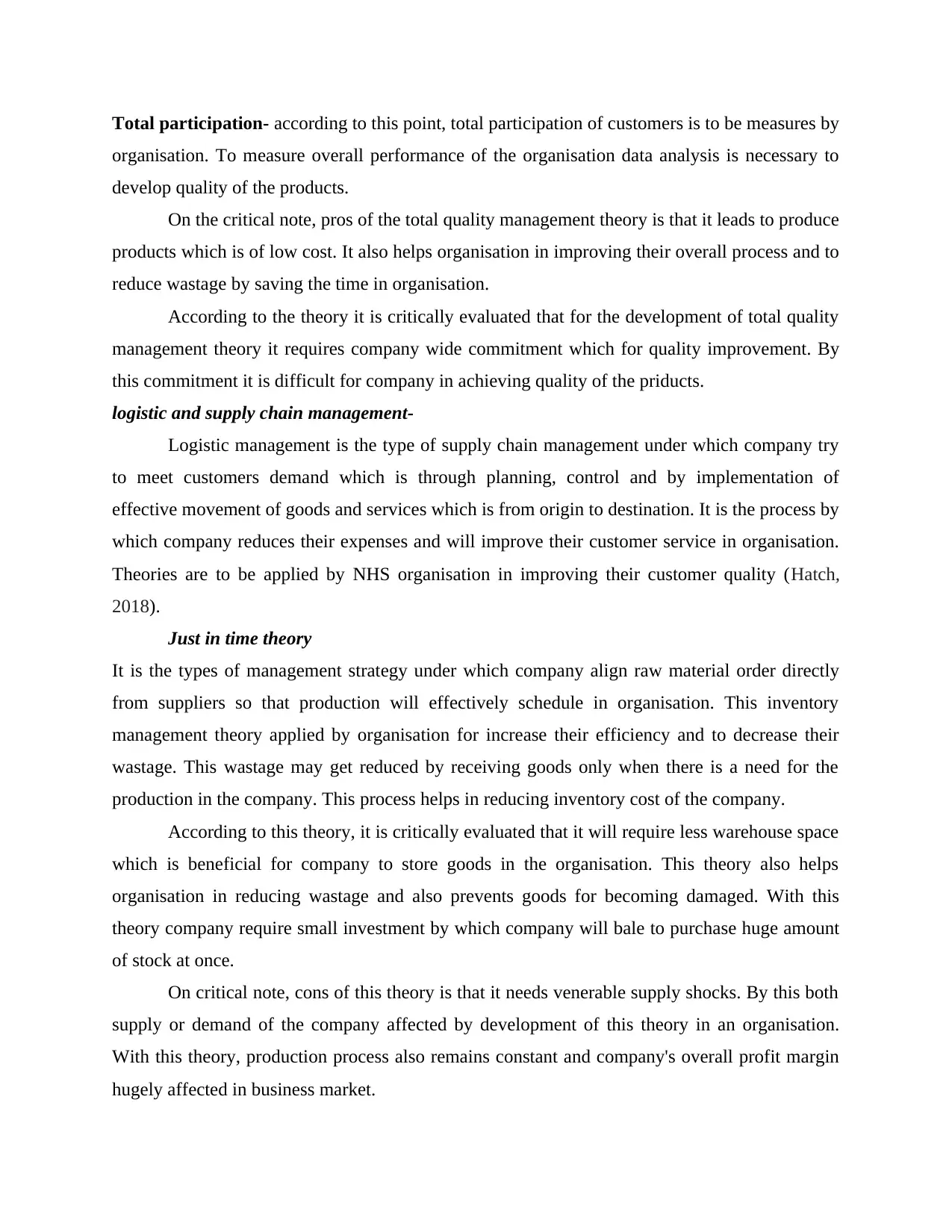
Total participation- according to this point, total participation of customers is to be measures by
organisation. To measure overall performance of the organisation data analysis is necessary to
develop quality of the products.
On the critical note, pros of the total quality management theory is that it leads to produce
products which is of low cost. It also helps organisation in improving their overall process and to
reduce wastage by saving the time in organisation.
According to the theory it is critically evaluated that for the development of total quality
management theory it requires company wide commitment which for quality improvement. By
this commitment it is difficult for company in achieving quality of the priducts.
logistic and supply chain management-
Logistic management is the type of supply chain management under which company try
to meet customers demand which is through planning, control and by implementation of
effective movement of goods and services which is from origin to destination. It is the process by
which company reduces their expenses and will improve their customer service in organisation.
Theories are to be applied by NHS organisation in improving their customer quality (Hatch,
2018).
Just in time theory
It is the types of management strategy under which company align raw material order directly
from suppliers so that production will effectively schedule in organisation. This inventory
management theory applied by organisation for increase their efficiency and to decrease their
wastage. This wastage may get reduced by receiving goods only when there is a need for the
production in the company. This process helps in reducing inventory cost of the company.
According to this theory, it is critically evaluated that it will require less warehouse space
which is beneficial for company to store goods in the organisation. This theory also helps
organisation in reducing wastage and also prevents goods for becoming damaged. With this
theory company require small investment by which company will bale to purchase huge amount
of stock at once.
On critical note, cons of this theory is that it needs venerable supply shocks. By this both
supply or demand of the company affected by development of this theory in an organisation.
With this theory, production process also remains constant and company's overall profit margin
hugely affected in business market.
organisation. To measure overall performance of the organisation data analysis is necessary to
develop quality of the products.
On the critical note, pros of the total quality management theory is that it leads to produce
products which is of low cost. It also helps organisation in improving their overall process and to
reduce wastage by saving the time in organisation.
According to the theory it is critically evaluated that for the development of total quality
management theory it requires company wide commitment which for quality improvement. By
this commitment it is difficult for company in achieving quality of the priducts.
logistic and supply chain management-
Logistic management is the type of supply chain management under which company try
to meet customers demand which is through planning, control and by implementation of
effective movement of goods and services which is from origin to destination. It is the process by
which company reduces their expenses and will improve their customer service in organisation.
Theories are to be applied by NHS organisation in improving their customer quality (Hatch,
2018).
Just in time theory
It is the types of management strategy under which company align raw material order directly
from suppliers so that production will effectively schedule in organisation. This inventory
management theory applied by organisation for increase their efficiency and to decrease their
wastage. This wastage may get reduced by receiving goods only when there is a need for the
production in the company. This process helps in reducing inventory cost of the company.
According to this theory, it is critically evaluated that it will require less warehouse space
which is beneficial for company to store goods in the organisation. This theory also helps
organisation in reducing wastage and also prevents goods for becoming damaged. With this
theory company require small investment by which company will bale to purchase huge amount
of stock at once.
On critical note, cons of this theory is that it needs venerable supply shocks. By this both
supply or demand of the company affected by development of this theory in an organisation.
With this theory, production process also remains constant and company's overall profit margin
hugely affected in business market.
⊘ This is a preview!⊘
Do you want full access?
Subscribe today to unlock all pages.

Trusted by 1+ million students worldwide
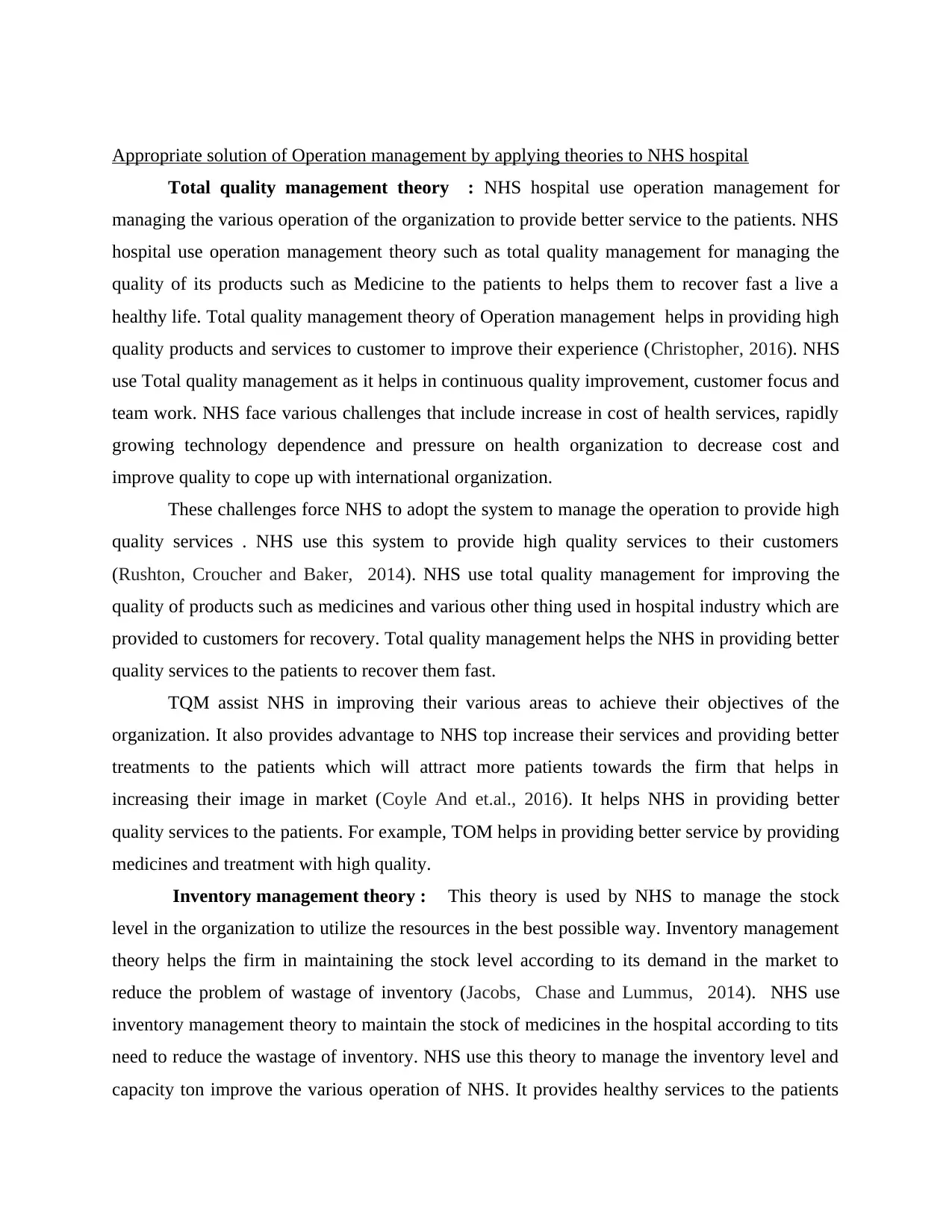
Appropriate solution of Operation management by applying theories to NHS hospital
Total quality management theory : NHS hospital use operation management for
managing the various operation of the organization to provide better service to the patients. NHS
hospital use operation management theory such as total quality management for managing the
quality of its products such as Medicine to the patients to helps them to recover fast a live a
healthy life. Total quality management theory of Operation management helps in providing high
quality products and services to customer to improve their experience (Christopher, 2016). NHS
use Total quality management as it helps in continuous quality improvement, customer focus and
team work. NHS face various challenges that include increase in cost of health services, rapidly
growing technology dependence and pressure on health organization to decrease cost and
improve quality to cope up with international organization.
These challenges force NHS to adopt the system to manage the operation to provide high
quality services . NHS use this system to provide high quality services to their customers
(Rushton, Croucher and Baker, 2014). NHS use total quality management for improving the
quality of products such as medicines and various other thing used in hospital industry which are
provided to customers for recovery. Total quality management helps the NHS in providing better
quality services to the patients to recover them fast.
TQM assist NHS in improving their various areas to achieve their objectives of the
organization. It also provides advantage to NHS top increase their services and providing better
treatments to the patients which will attract more patients towards the firm that helps in
increasing their image in market (Coyle And et.al., 2016). It helps NHS in providing better
quality services to the patients. For example, TOM helps in providing better service by providing
medicines and treatment with high quality.
Inventory management theory : This theory is used by NHS to manage the stock
level in the organization to utilize the resources in the best possible way. Inventory management
theory helps the firm in maintaining the stock level according to its demand in the market to
reduce the problem of wastage of inventory (Jacobs, Chase and Lummus, 2014). NHS use
inventory management theory to maintain the stock of medicines in the hospital according to tits
need to reduce the wastage of inventory. NHS use this theory to manage the inventory level and
capacity ton improve the various operation of NHS. It provides healthy services to the patients
Total quality management theory : NHS hospital use operation management for
managing the various operation of the organization to provide better service to the patients. NHS
hospital use operation management theory such as total quality management for managing the
quality of its products such as Medicine to the patients to helps them to recover fast a live a
healthy life. Total quality management theory of Operation management helps in providing high
quality products and services to customer to improve their experience (Christopher, 2016). NHS
use Total quality management as it helps in continuous quality improvement, customer focus and
team work. NHS face various challenges that include increase in cost of health services, rapidly
growing technology dependence and pressure on health organization to decrease cost and
improve quality to cope up with international organization.
These challenges force NHS to adopt the system to manage the operation to provide high
quality services . NHS use this system to provide high quality services to their customers
(Rushton, Croucher and Baker, 2014). NHS use total quality management for improving the
quality of products such as medicines and various other thing used in hospital industry which are
provided to customers for recovery. Total quality management helps the NHS in providing better
quality services to the patients to recover them fast.
TQM assist NHS in improving their various areas to achieve their objectives of the
organization. It also provides advantage to NHS top increase their services and providing better
treatments to the patients which will attract more patients towards the firm that helps in
increasing their image in market (Coyle And et.al., 2016). It helps NHS in providing better
quality services to the patients. For example, TOM helps in providing better service by providing
medicines and treatment with high quality.
Inventory management theory : This theory is used by NHS to manage the stock
level in the organization to utilize the resources in the best possible way. Inventory management
theory helps the firm in maintaining the stock level according to its demand in the market to
reduce the problem of wastage of inventory (Jacobs, Chase and Lummus, 2014). NHS use
inventory management theory to maintain the stock of medicines in the hospital according to tits
need to reduce the wastage of inventory. NHS use this theory to manage the inventory level and
capacity ton improve the various operation of NHS. It provides healthy services to the patients
Paraphrase This Document
Need a fresh take? Get an instant paraphrase of this document with our AI Paraphraser
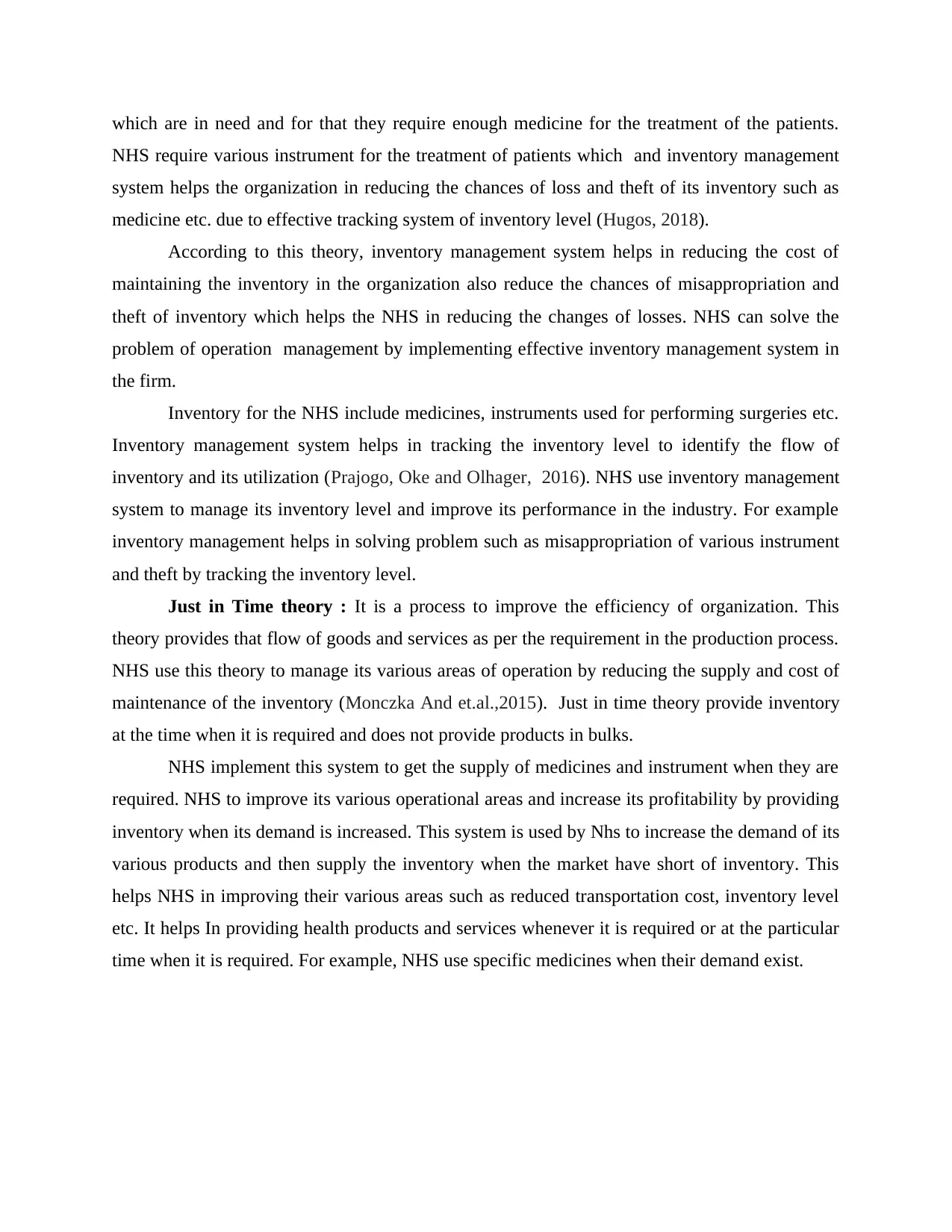
which are in need and for that they require enough medicine for the treatment of the patients.
NHS require various instrument for the treatment of patients which and inventory management
system helps the organization in reducing the chances of loss and theft of its inventory such as
medicine etc. due to effective tracking system of inventory level (Hugos, 2018).
According to this theory, inventory management system helps in reducing the cost of
maintaining the inventory in the organization also reduce the chances of misappropriation and
theft of inventory which helps the NHS in reducing the changes of losses. NHS can solve the
problem of operation management by implementing effective inventory management system in
the firm.
Inventory for the NHS include medicines, instruments used for performing surgeries etc.
Inventory management system helps in tracking the inventory level to identify the flow of
inventory and its utilization (Prajogo, Oke and Olhager, 2016). NHS use inventory management
system to manage its inventory level and improve its performance in the industry. For example
inventory management helps in solving problem such as misappropriation of various instrument
and theft by tracking the inventory level.
Just in Time theory : It is a process to improve the efficiency of organization. This
theory provides that flow of goods and services as per the requirement in the production process.
NHS use this theory to manage its various areas of operation by reducing the supply and cost of
maintenance of the inventory (Monczka And et.al.,2015). Just in time theory provide inventory
at the time when it is required and does not provide products in bulks.
NHS implement this system to get the supply of medicines and instrument when they are
required. NHS to improve its various operational areas and increase its profitability by providing
inventory when its demand is increased. This system is used by Nhs to increase the demand of its
various products and then supply the inventory when the market have short of inventory. This
helps NHS in improving their various areas such as reduced transportation cost, inventory level
etc. It helps In providing health products and services whenever it is required or at the particular
time when it is required. For example, NHS use specific medicines when their demand exist.
NHS require various instrument for the treatment of patients which and inventory management
system helps the organization in reducing the chances of loss and theft of its inventory such as
medicine etc. due to effective tracking system of inventory level (Hugos, 2018).
According to this theory, inventory management system helps in reducing the cost of
maintaining the inventory in the organization also reduce the chances of misappropriation and
theft of inventory which helps the NHS in reducing the changes of losses. NHS can solve the
problem of operation management by implementing effective inventory management system in
the firm.
Inventory for the NHS include medicines, instruments used for performing surgeries etc.
Inventory management system helps in tracking the inventory level to identify the flow of
inventory and its utilization (Prajogo, Oke and Olhager, 2016). NHS use inventory management
system to manage its inventory level and improve its performance in the industry. For example
inventory management helps in solving problem such as misappropriation of various instrument
and theft by tracking the inventory level.
Just in Time theory : It is a process to improve the efficiency of organization. This
theory provides that flow of goods and services as per the requirement in the production process.
NHS use this theory to manage its various areas of operation by reducing the supply and cost of
maintenance of the inventory (Monczka And et.al.,2015). Just in time theory provide inventory
at the time when it is required and does not provide products in bulks.
NHS implement this system to get the supply of medicines and instrument when they are
required. NHS to improve its various operational areas and increase its profitability by providing
inventory when its demand is increased. This system is used by Nhs to increase the demand of its
various products and then supply the inventory when the market have short of inventory. This
helps NHS in improving their various areas such as reduced transportation cost, inventory level
etc. It helps In providing health products and services whenever it is required or at the particular
time when it is required. For example, NHS use specific medicines when their demand exist.
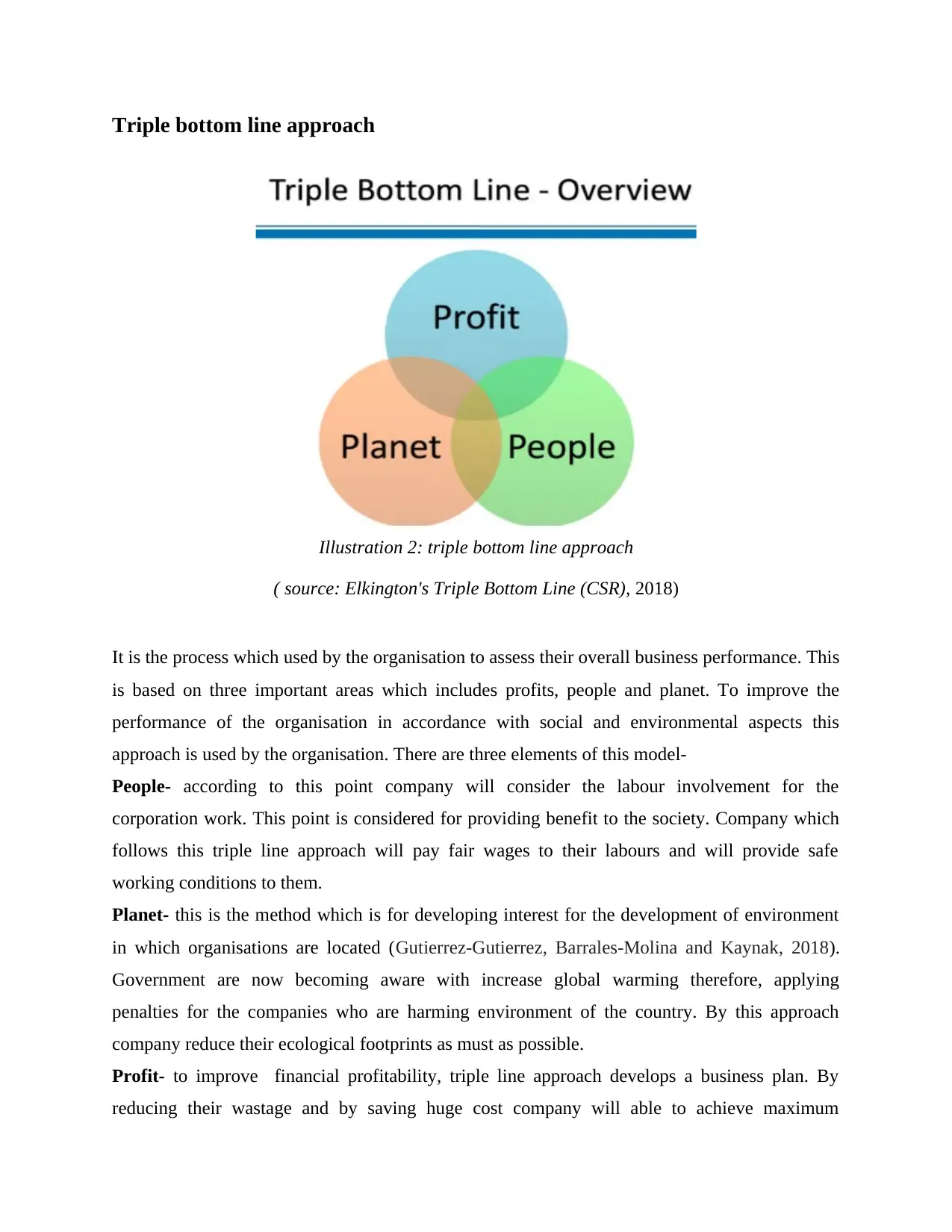
Triple bottom line approach
It is the process which used by the organisation to assess their overall business performance. This
is based on three important areas which includes profits, people and planet. To improve the
performance of the organisation in accordance with social and environmental aspects this
approach is used by the organisation. There are three elements of this model-
People- according to this point company will consider the labour involvement for the
corporation work. This point is considered for providing benefit to the society. Company which
follows this triple line approach will pay fair wages to their labours and will provide safe
working conditions to them.
Planet- this is the method which is for developing interest for the development of environment
in which organisations are located (Gutierrez-Gutierrez, Barrales-Molina and Kaynak, 2018).
Government are now becoming aware with increase global warming therefore, applying
penalties for the companies who are harming environment of the country. By this approach
company reduce their ecological footprints as must as possible.
Profit- to improve financial profitability, triple line approach develops a business plan. By
reducing their wastage and by saving huge cost company will able to achieve maximum
Illustration 2: triple bottom line approach
( source: Elkington's Triple Bottom Line (CSR), 2018)
It is the process which used by the organisation to assess their overall business performance. This
is based on three important areas which includes profits, people and planet. To improve the
performance of the organisation in accordance with social and environmental aspects this
approach is used by the organisation. There are three elements of this model-
People- according to this point company will consider the labour involvement for the
corporation work. This point is considered for providing benefit to the society. Company which
follows this triple line approach will pay fair wages to their labours and will provide safe
working conditions to them.
Planet- this is the method which is for developing interest for the development of environment
in which organisations are located (Gutierrez-Gutierrez, Barrales-Molina and Kaynak, 2018).
Government are now becoming aware with increase global warming therefore, applying
penalties for the companies who are harming environment of the country. By this approach
company reduce their ecological footprints as must as possible.
Profit- to improve financial profitability, triple line approach develops a business plan. By
reducing their wastage and by saving huge cost company will able to achieve maximum
Illustration 2: triple bottom line approach
( source: Elkington's Triple Bottom Line (CSR), 2018)
⊘ This is a preview!⊘
Do you want full access?
Subscribe today to unlock all pages.

Trusted by 1+ million students worldwide
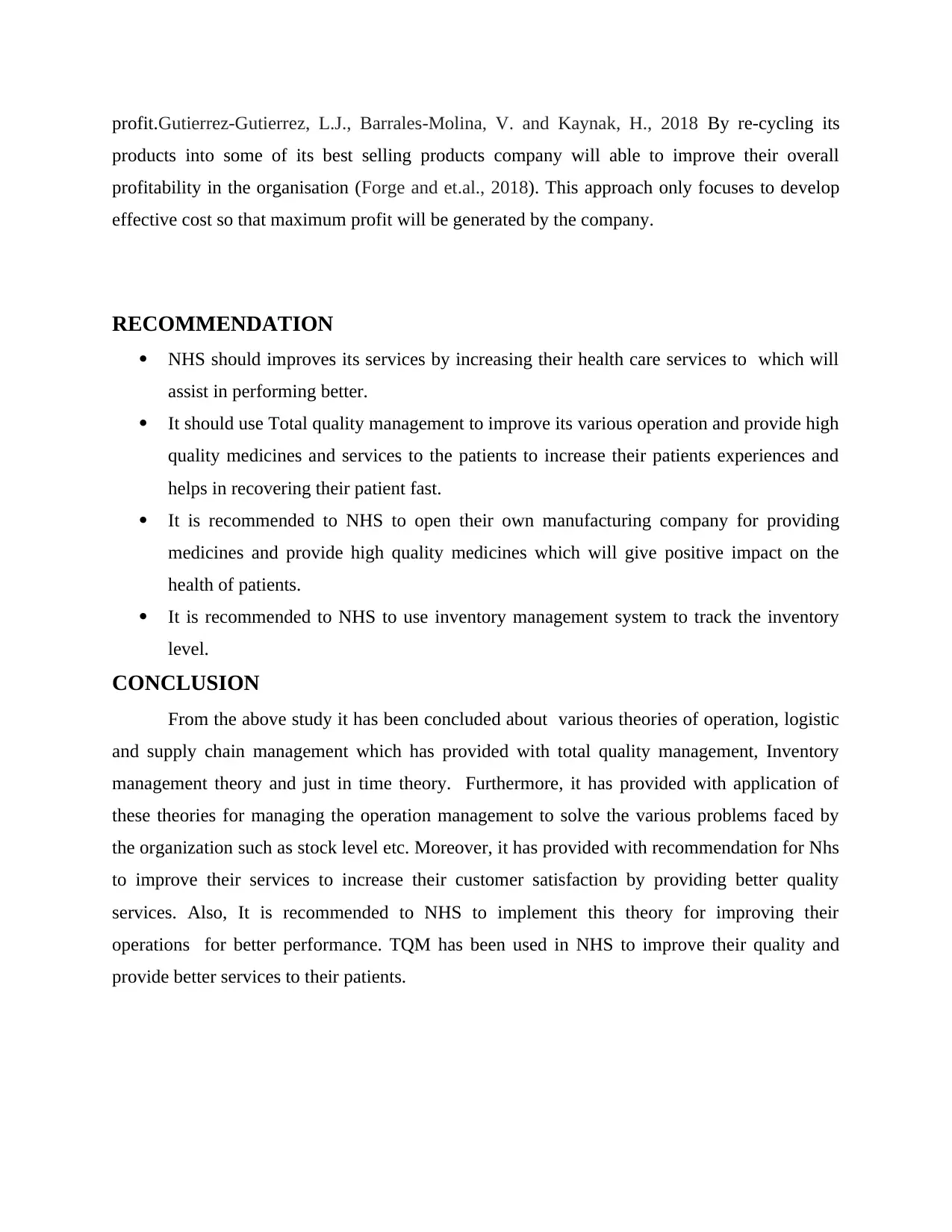
profit.Gutierrez-Gutierrez, L.J., Barrales-Molina, V. and Kaynak, H., 2018 By re-cycling its
products into some of its best selling products company will able to improve their overall
profitability in the organisation (Forge and et.al., 2018). This approach only focuses to develop
effective cost so that maximum profit will be generated by the company.
RECOMMENDATION
NHS should improves its services by increasing their health care services to which will
assist in performing better.
It should use Total quality management to improve its various operation and provide high
quality medicines and services to the patients to increase their patients experiences and
helps in recovering their patient fast.
It is recommended to NHS to open their own manufacturing company for providing
medicines and provide high quality medicines which will give positive impact on the
health of patients.
It is recommended to NHS to use inventory management system to track the inventory
level.
CONCLUSION
From the above study it has been concluded about various theories of operation, logistic
and supply chain management which has provided with total quality management, Inventory
management theory and just in time theory. Furthermore, it has provided with application of
these theories for managing the operation management to solve the various problems faced by
the organization such as stock level etc. Moreover, it has provided with recommendation for Nhs
to improve their services to increase their customer satisfaction by providing better quality
services. Also, It is recommended to NHS to implement this theory for improving their
operations for better performance. TQM has been used in NHS to improve their quality and
provide better services to their patients.
products into some of its best selling products company will able to improve their overall
profitability in the organisation (Forge and et.al., 2018). This approach only focuses to develop
effective cost so that maximum profit will be generated by the company.
RECOMMENDATION
NHS should improves its services by increasing their health care services to which will
assist in performing better.
It should use Total quality management to improve its various operation and provide high
quality medicines and services to the patients to increase their patients experiences and
helps in recovering their patient fast.
It is recommended to NHS to open their own manufacturing company for providing
medicines and provide high quality medicines which will give positive impact on the
health of patients.
It is recommended to NHS to use inventory management system to track the inventory
level.
CONCLUSION
From the above study it has been concluded about various theories of operation, logistic
and supply chain management which has provided with total quality management, Inventory
management theory and just in time theory. Furthermore, it has provided with application of
these theories for managing the operation management to solve the various problems faced by
the organization such as stock level etc. Moreover, it has provided with recommendation for Nhs
to improve their services to increase their customer satisfaction by providing better quality
services. Also, It is recommended to NHS to implement this theory for improving their
operations for better performance. TQM has been used in NHS to improve their quality and
provide better services to their patients.
Paraphrase This Document
Need a fresh take? Get an instant paraphrase of this document with our AI Paraphraser
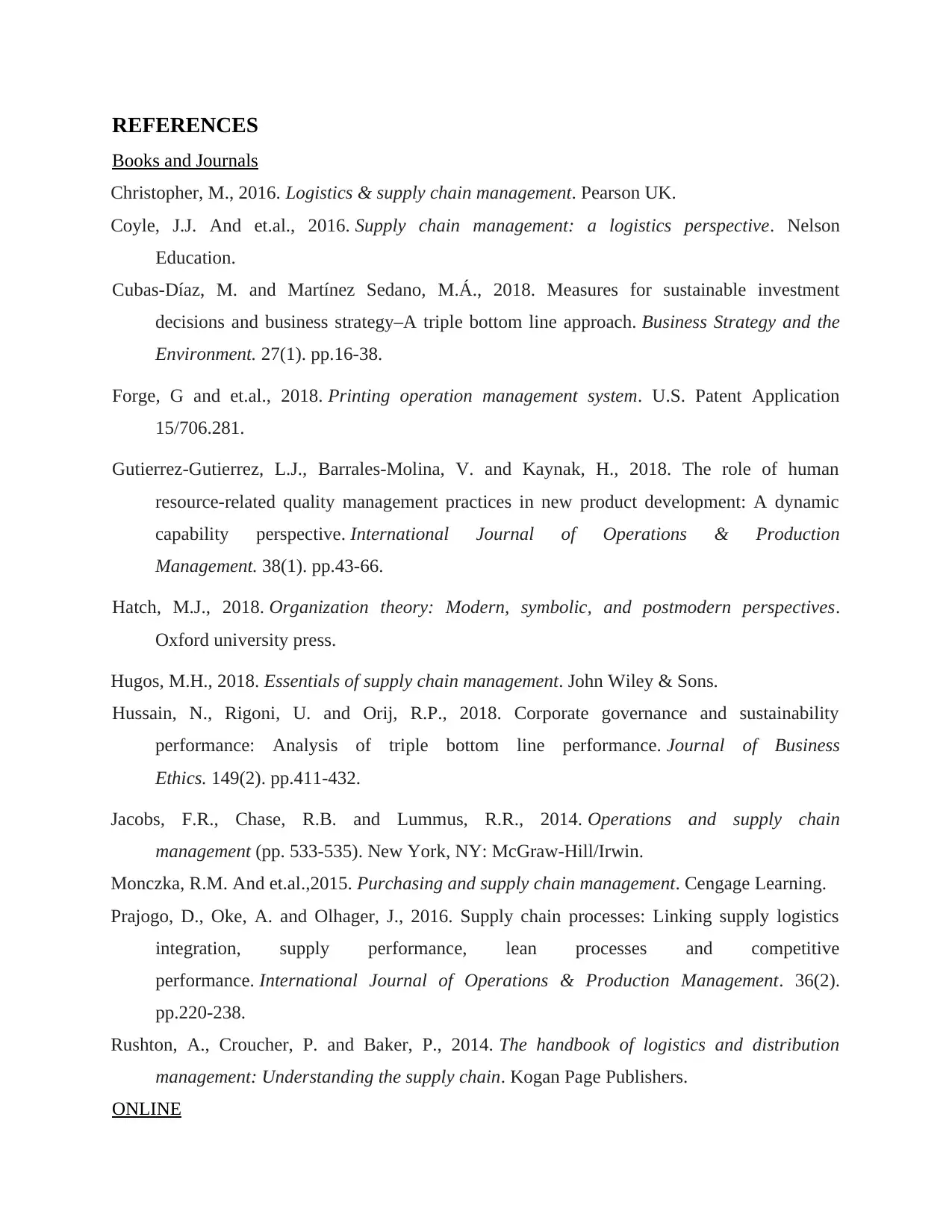
REFERENCES
Books and Journals
Christopher, M., 2016. Logistics & supply chain management. Pearson UK.
Coyle, J.J. And et.al., 2016. Supply chain management: a logistics perspective. Nelson
Education.
Cubas‐Díaz, M. and Martínez Sedano, M.Á., 2018. Measures for sustainable investment
decisions and business strategy–A triple bottom line approach. Business Strategy and the
Environment. 27(1). pp.16-38.
Forge, G and et.al., 2018. Printing operation management system. U.S. Patent Application
15/706.281.
Gutierrez-Gutierrez, L.J., Barrales-Molina, V. and Kaynak, H., 2018. The role of human
resource-related quality management practices in new product development: A dynamic
capability perspective. International Journal of Operations & Production
Management. 38(1). pp.43-66.
Hatch, M.J., 2018. Organization theory: Modern, symbolic, and postmodern perspectives.
Oxford university press.
Hugos, M.H., 2018. Essentials of supply chain management. John Wiley & Sons.
Hussain, N., Rigoni, U. and Orij, R.P., 2018. Corporate governance and sustainability
performance: Analysis of triple bottom line performance. Journal of Business
Ethics. 149(2). pp.411-432.
Jacobs, F.R., Chase, R.B. and Lummus, R.R., 2014. Operations and supply chain
management (pp. 533-535). New York, NY: McGraw-Hill/Irwin.
Monczka, R.M. And et.al.,2015. Purchasing and supply chain management. Cengage Learning.
Prajogo, D., Oke, A. and Olhager, J., 2016. Supply chain processes: Linking supply logistics
integration, supply performance, lean processes and competitive
performance. International Journal of Operations & Production Management. 36(2).
pp.220-238.
Rushton, A., Croucher, P. and Baker, P., 2014. The handbook of logistics and distribution
management: Understanding the supply chain. Kogan Page Publishers.
ONLINE
Books and Journals
Christopher, M., 2016. Logistics & supply chain management. Pearson UK.
Coyle, J.J. And et.al., 2016. Supply chain management: a logistics perspective. Nelson
Education.
Cubas‐Díaz, M. and Martínez Sedano, M.Á., 2018. Measures for sustainable investment
decisions and business strategy–A triple bottom line approach. Business Strategy and the
Environment. 27(1). pp.16-38.
Forge, G and et.al., 2018. Printing operation management system. U.S. Patent Application
15/706.281.
Gutierrez-Gutierrez, L.J., Barrales-Molina, V. and Kaynak, H., 2018. The role of human
resource-related quality management practices in new product development: A dynamic
capability perspective. International Journal of Operations & Production
Management. 38(1). pp.43-66.
Hatch, M.J., 2018. Organization theory: Modern, symbolic, and postmodern perspectives.
Oxford university press.
Hugos, M.H., 2018. Essentials of supply chain management. John Wiley & Sons.
Hussain, N., Rigoni, U. and Orij, R.P., 2018. Corporate governance and sustainability
performance: Analysis of triple bottom line performance. Journal of Business
Ethics. 149(2). pp.411-432.
Jacobs, F.R., Chase, R.B. and Lummus, R.R., 2014. Operations and supply chain
management (pp. 533-535). New York, NY: McGraw-Hill/Irwin.
Monczka, R.M. And et.al.,2015. Purchasing and supply chain management. Cengage Learning.
Prajogo, D., Oke, A. and Olhager, J., 2016. Supply chain processes: Linking supply logistics
integration, supply performance, lean processes and competitive
performance. International Journal of Operations & Production Management. 36(2).
pp.220-238.
Rushton, A., Croucher, P. and Baker, P., 2014. The handbook of logistics and distribution
management: Understanding the supply chain. Kogan Page Publishers.
ONLINE
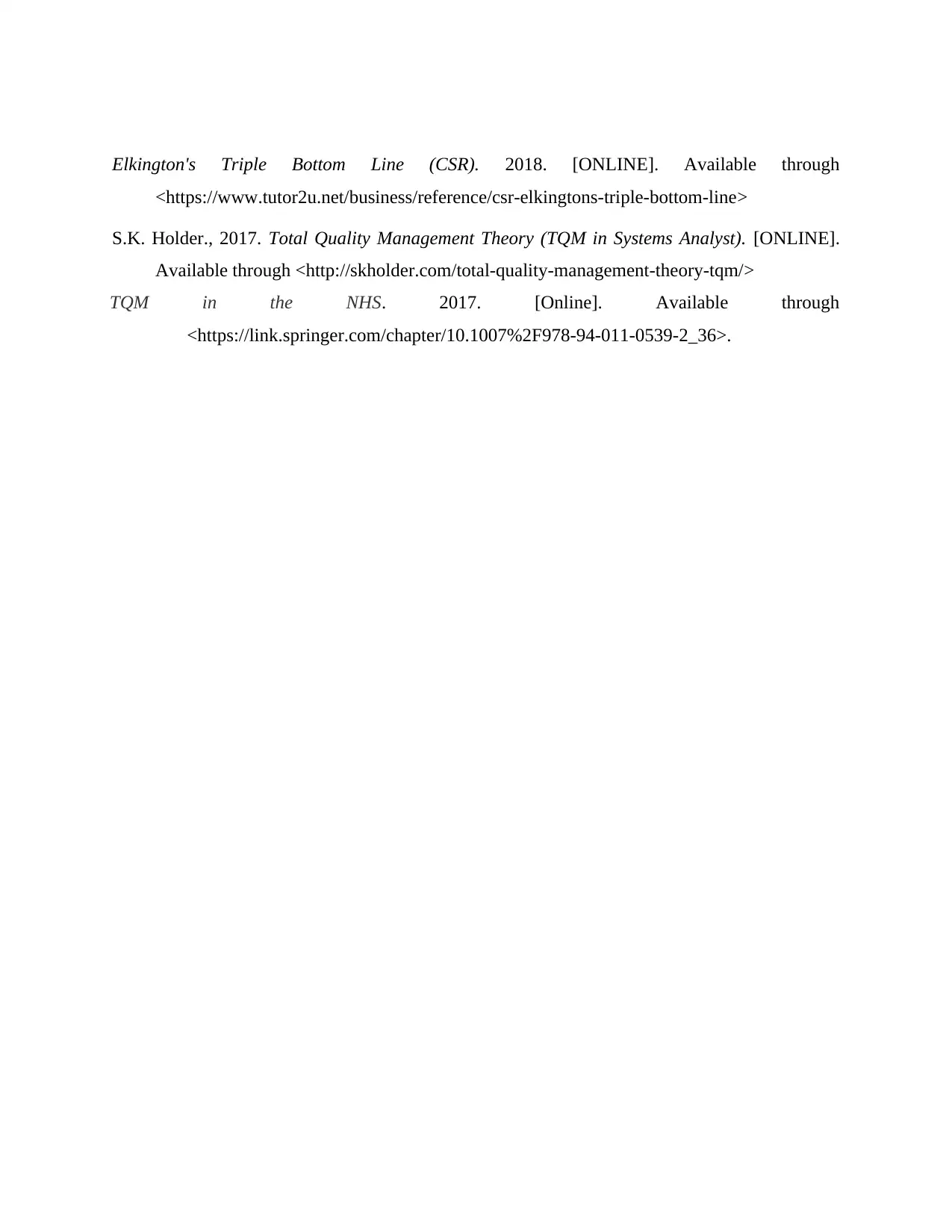
Elkington's Triple Bottom Line (CSR). 2018. [ONLINE]. Available through
<https://www.tutor2u.net/business/reference/csr-elkingtons-triple-bottom-line>
S.K. Holder., 2017. Total Quality Management Theory (TQM in Systems Analyst). [ONLINE].
Available through <http://skholder.com/total-quality-management-theory-tqm/>
TQM in the NHS. 2017. [Online]. Available through
<https://link.springer.com/chapter/10.1007%2F978-94-011-0539-2_36>.
<https://www.tutor2u.net/business/reference/csr-elkingtons-triple-bottom-line>
S.K. Holder., 2017. Total Quality Management Theory (TQM in Systems Analyst). [ONLINE].
Available through <http://skholder.com/total-quality-management-theory-tqm/>
TQM in the NHS. 2017. [Online]. Available through
<https://link.springer.com/chapter/10.1007%2F978-94-011-0539-2_36>.
⊘ This is a preview!⊘
Do you want full access?
Subscribe today to unlock all pages.

Trusted by 1+ million students worldwide
1 out of 12
Related Documents
Your All-in-One AI-Powered Toolkit for Academic Success.
+13062052269
info@desklib.com
Available 24*7 on WhatsApp / Email
![[object Object]](/_next/static/media/star-bottom.7253800d.svg)
Unlock your academic potential
Copyright © 2020–2026 A2Z Services. All Rights Reserved. Developed and managed by ZUCOL.





